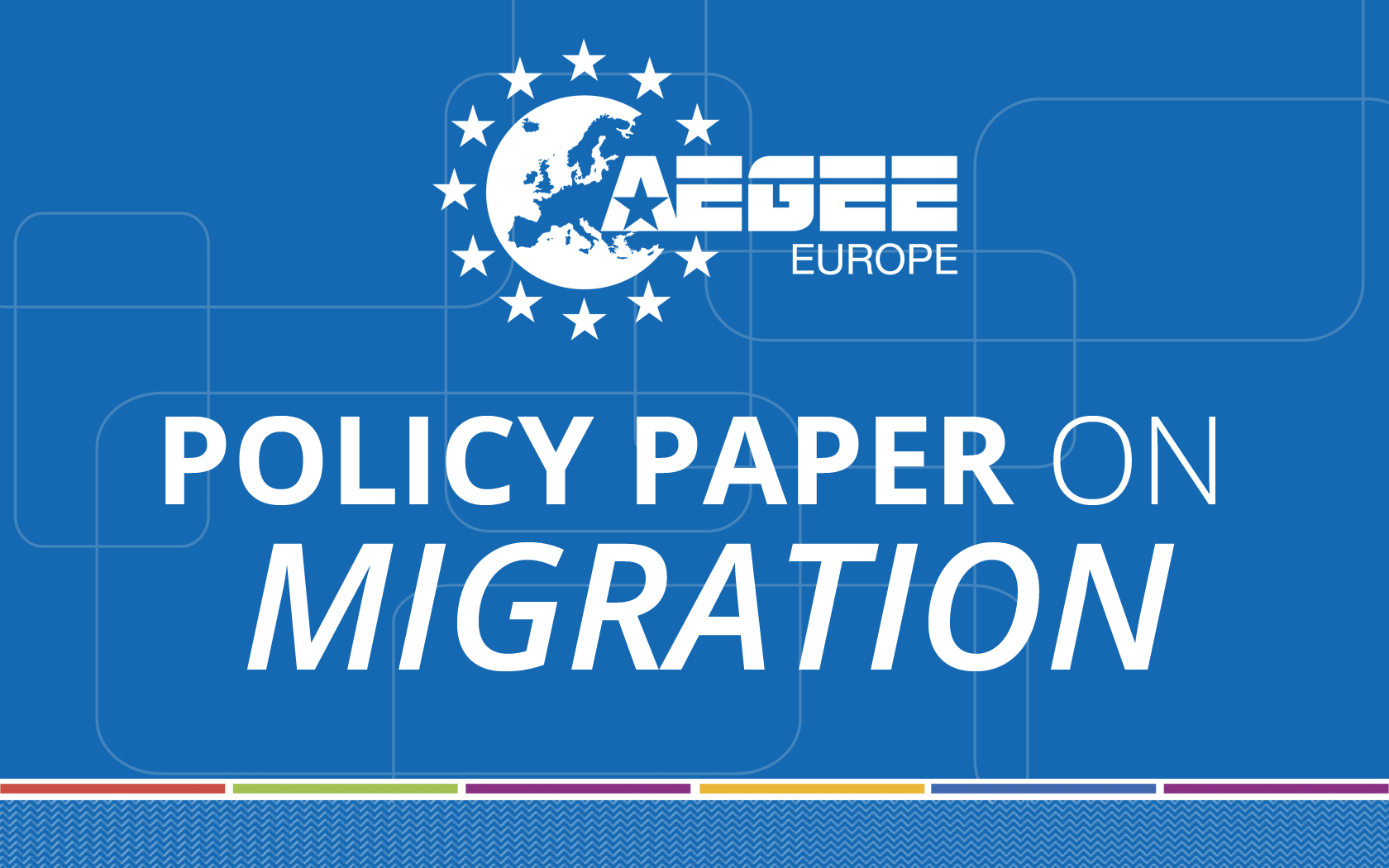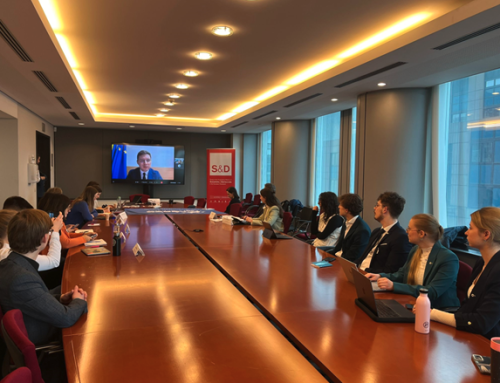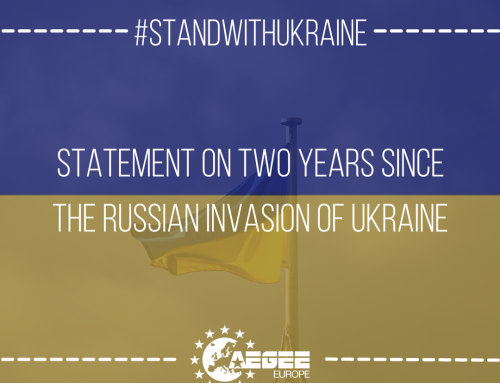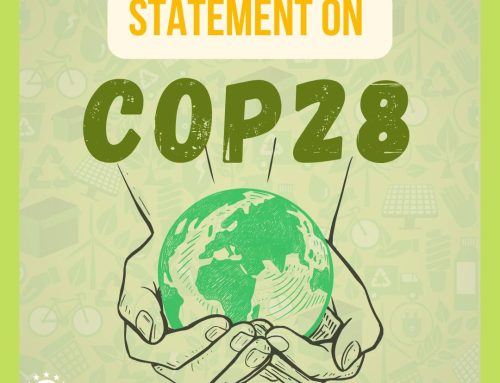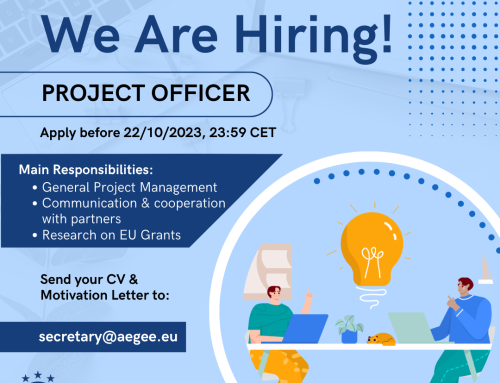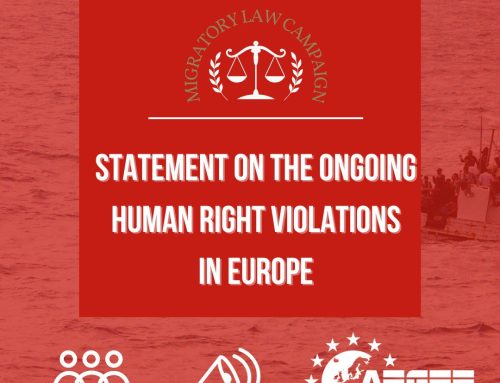AEGEE-Europe Policy Paper on Migration
Adopted in Spring Agora Bergamo, May 2016
01 | SUMMARY
AEGEE (Association des Etats Généraux des Etudiants de l’Europe / European Students’ Forum) was created under a vision of a borderless, unified Europe, based on democracy and respect for human rights, by bringing together students with different cultural backgrounds. Today, AEGEE is Europe’s largest interdisciplinary youth organization present in 200 cities in 40 countries and with 13.000 friends.
As stated in its Statement of Principles, the members of AEGEE “come together under a common vision of a democratic, diverse and borderless Europe” where “freedom and human rights are essential elements of a European society” [1].
These principles are the key aspect behind the concerns most of our members have about the topic of migration, especially because the diversity of the AEGEE network’s stance in tackling the topic of migration and coming together on common points to agree on based on our values.
As broadly defined in the Annex section A , there are different types of migrants. The categories which are deepened the most in this paper are Forced Migrants and Economic Migrants.
Dealing with Economic Migration in Europe, the Schengen Agreement set in 1985 led to the opening of borders between different European states and resulted in an undoubtedly revolutionary process, not only for European citizens (mostly economic migrants) but also for trade and consequently for the economy.
In fact, according to Davis and Gift (2014)[2], “When two countries are members of Schengen, total trade between them increases by approximately 0.10% every year and a net increase in immigrants from one country to another by just 1%, expand trade between 2 nations by almost an equivalent amount”.
Mobility (migration) of citizens, and in particular of labor, is one of the fundamental preconditions for optimum currency areas like the Eurozone is supposed to be, as stated by Farhi and Werning (2014)[3] (who reinforced the theory proposed by 1999 Nobel Prize for Economics, Robert Mundell[4]) who proved that “Optimal government interventions should encourage migrations out of depressed regions”.
Millions of young people all over the world are migrating due to several reasons today. Some of these millions are migrating within Europe [5].
On top of that, in the year 2015, the so called “European migrant crisis” hit Europe in a very dreadful way. For a very long time, the issue of refugees was mostly just a local, peripheral problem which affected peripheral European countries like Turkey, Spain, Italy and partially Greece. In the year 2015 instead, other countries – from Greece up to the Balkan peninsula until Austria and Germany – had their political agenda incredibly affected by the European migrant crisis. A significant percentage of these Forced Migrants are young people. [6]
With the opening of the so-called Balkan Route (while previously most of the arrivals were coming from the Mediterranean route [7]), the European migrant crisis got broader attention from media worldwide and led to a temporary (later became “undefined period”) suspension of the Schengen agreement in the year of its 20th anniversary [8].
In order to build “A strong Europe upon the foundations of respect, tolerance and solidarity”, the heads of State of the European Countries need to follow democratic values and human rights which are the fundamental tools to get to “an inclusive society where citizens enjoy equal opportunities and rights”. Also, closing borders and building fences in Europe is against our spirit of “striving for a Borderless Europe”. Finally, not providing necessary help to refugees and not providing asylum is against AEGEE’s concept of solidarity and tolerance.
Our solidarity and our tolerance shall not refer only to every European citizen [8], but it also should refer to every human being who decides to migrate, everyone who attempts, everyone who risks his/her own life or flee to Europe to escape from any type of persecutions or conflicts, as according to:
– the article 1. A2 of the Geneva Convention [10];
– the articles 13 and 14 of the Human Rights Declaration [11];
– the International Convention on the Protection of the Rights of All Migrant Workers and Members of Their Families [12];
– Comment no. 20 of E/C.12/GC/20 (2 July 2009) about “Non-Discrimination in Economic, Social and Cultural Rights of the Foreign People” [13];
– General comment no. 16 of 27th session (1986) about “The position of aliens under the Covenant” [14].
02 | QUANTIFICATION
Europe throughout the centuries, has seen millions of people migrate for several reasons: economic opportunities, educational intentions (in this case, we remind that AEGEE contributed to the birth of the ERASMUS program [23]) but mostly necessity, no matter those people were forced to or not to.
In the last 20 years, lots of conflicts continued or arose either in Europe or in its peripheral areas. To name few:
– Europe: Eastern Ukraine, Kosovo, Former Yugoslavia, Albania, Nagorno-Karabakh, South Ossetia and Abkhazia;
– Peripheral area: Libya, Palestine and lastly Iraq/Syria.
These conflicts along with persecutions currently ongoing in other non-peripheral areas (Afghanistan, Pakistan, Sub-Saharan Africa), caused over 4.4 million people asylum requests in the EU 28 countries inthe period 2005-2015, (culminated with 1.3 million people requesting just for the year 2015). Only the 52.2% of these requests were accepted [24].
Conversely, just in the year 2013, 3.39 million people in EU 28 countries migrated due to economic or educational intentions.
03 | AEGEE’S POSITION
3.1 – DATA ANALYSIS: THE MIGRATION SURVEY RESULTS
In order to address an opinion from the AEGEE Network, we conducted an internal research which consisted on asking through a survey, for 26 days, the opinions of a good sample of AEGEEans.
The aim was to show the general perception and the raised awareness AEGEEans had about the topic of Migration, with special regard to Refugees (Forced Migrants) and Economic Migrants, practices of Interculturalism or Multiculturalism.
Throughout a list of 36 questions, the participants were asked to express personal opinions in order
to build an important, continental and various democratic reflection on these delicate topics.
219 participants representing 88 antennae from 30 different countries of the network in 26 days contributed to this survey. This survey was open to every AEGEEan of present and from the past who has shown interest on the topic. All the participants intervened in this survey represented 1.68% of all the AEGEEans in the network today (according to the global estimation of 13000 AEGEEans, given by the Comité Directeur).
The results (presented during the AEGEE Fair at EPM Leiden 2016) were the following:
· About possible approaches working, AEGEEans thought that Multicultural approach worked better (31%) in their countries with respect to Intercultural approach (20%). Despite that, the majority of AEGEEans rather prefer to have implemented practices of Interculturalism (57%);
· Later we asked different questions for either economic migrants and forced migrants, in order to realize the general level of awareness in the whole network. The results are included in table no. 1:
Table no. 1 – Economic Migrants vs Forced Migrants – Highlights from Interviewed people
| Opinions about:
Economic Migrant(s)/Migration |
Opinions about:
Forced Migrant(s)/ Migration/European migrant crisis |
|
| Have you ever discussed
about refugees / economic migrants? |
50% of the interviewed discussed about this topic, 40% did not | |
| Have you ever met a…? | 50% said yes | 62% said yes |
| To what extent do you feel threatened by…? | 21% by the enhancement of nationalism/racism and xenophobia;
18% are not feeling threatened; 16% by economic problems in the country; 16% by cultural problems; 16% by ghettoization. |
24% are not threatened at all;
19% by cultural problems; 18% by ghettoization; 12% by terrorism; 11% by economic problems in my country; 11% by increased perception of criminality |
| What is your personal feeling about…? | 38% said it is a natural unavoidable phenomenon;
19% said it is a bad result of politics at both national or international level; ~16% are fine with that. |
~27% said that they want to welcome refugees and they want them to integrate in the society
~21% claimed that EU has to change attitude, to a more tolerant behavior; ~14% said they are scared; ~8% proved empathy for them; ~8% defined the crisis as a big challenge |
| Are you willing to organize events for… ? | 50% said they are willing, 16% still have to decide, 34% are not willing | |
| Do you think that migrants could be successfully integrated in our countries? | 66% said yes; 14% don’t know, 20% said no | |
| What is the level of integration in your city of …? | 33% said good or more;
32% are neutral; 35% said poor or less. |
16% said good or more;
27% are neutral; 57% said poor or less. |
| How do you judge the level of integration in your country with …? | 40% said poor or absent;
30% are neutral; 30% said good or more. |
61% said poor or totally absent;
25% are neutral; 14% said good or more. |
| What policies should your country/EU adopt/implement for…? | 28% facilitation of education;
22% Integration policies; 16% A more effective EU legal framework 9% raise security and controls 7% raise awareness among Europeans |
22% facilitate bureaucracy;
14% Integration policies; 13% Offer of public services; 9% Ensuring equal opportunities. |
SOURCE: AEGEE Migration in Europe – Survey Results (2016) [17]
· Considering other data gathered from the intervened people in the survey:
o Only 28% of the antennae have volunteered for refugees, 31% are willing to destine part of the budget (personal or through a funds’ gathering) to refugees, 33% provided different types of services to them (even without volunteering), 50% of the antennae are willing to setting up initiatives or events for them and 52% are aware about initiatives currently running in their cities;
o 56% said there are initiatives in their cities about refugees while 36% do not know;
o AEGEEans are aware of some examples of services provided to migrants by their state, as well as the education services;
o 45.87% declared that according to certain extents, they feel close to Refugees, while almost 15% declared they are feeling close to them no matter the extent and almost 30% don’t feel them culturally close at all;
o With relation to the origin, 47% of the people felt more close to the European Refugees, 22% to any refugee, 13% to the Middle-Eastern and 9% don’t feel close at all;
o 69% of the people declared that Civic Education can be a tool to tackle against the threatening feelings some young people might have;
o Beyond Education System, we observed that
§ almost 17% considered sanctioning Media which abuses of scaremonging messages;
§ more than 19% considered making serious controls on threatening messages on both Media and Social Media;
§ almost 27% considered bringing “skeptic” people to meetings with Refugees / Economic Migrants;
§ almost 29% retained important to improving the level of talks in the domestic/family/friends atmosphere;
§ almost 4% considered taking Actions without sanctioning media.
· About the perception of which can be the borders of a Borderless Europe AEGEE strives for, the people:
o Retained for a 23% that the borders are cultural prejudices;
o Retained for more than 5% that borders are with countries who are not collaborating to a common EU migration plan;
o Retained for almost 19% that the borders are the ones of the Schengen Area;
o Retained for more than 7% to strive for a borderless world;
· The intervened people in the survey thought that AEGEE should do:
o At a local level:
§ 30.56% wants to raise awareness between friends and in the city;
§ 10.49% wants to help NGOs and volunteer;
§ 12.35% wants to promote integration, solidarity, dialogue, tolerance and common sense;
§ 26.54% wants to organize events and educate them.
o At the European Level:
§ 34.52% wants AEGEE Europe to raise awareness through campaigns and discussions;
§ 14.59% wants AEGEE Europe to lobby decision makers;
§ 17.08% wants AEGEE Europe to be a link/platform among different countries about promotion of Integration;
§ 12.46% wants AEGEE Europe to concretely help refugees or NGOs, Campaign with NGOs and Support Welcoming Processes
3.2 – CONCLUSIONS
AEGEE is a students’ association that empowers young Europeans by giving them a platform for debate and personal development as well as stands for freedom and human rights. We strive for a borderless Europe and we believe that education gives better opportunities to Youth from all over Europe.
These principles are perfectly related to a Europe which is open, rich in diversity, sympathetic and tolerant towards any kind of migrant.
AEGEE Europe now and in the past dealt with projects which were in some sense related to Migration, which are/were:
- Eastern Partnership [18];
- EuroArab [19];
- Europe in Exchange [20];
- Democracy in Practice [21];
- Former Human Rights Working Group [22];
- Where Does Europe End [23];
- Beyond Europe [24];
- Youth Mobility Working Group (Working group part of the 2014-2017 AEGEE Europe’s Strategic Plan) [25]
All these projects clearly reflected the focus that Europe is not just a geographical definition with uncertain boundaries, but mostly Europe is defined by the human rights our continent defined and achieved; by the democracies which ended sorrowful decades full of conflicts, authoritarianisms and isolationisms; by the education provided in order to reach the “the full development of the human personality and to the strengthening of respect for human rights and fundamental freedoms, to “promote understanding, tolerance and friendship among all nations, racial or religious groups, and “further the activities of the United Nations for the maintenance of peace” [26].
AEGEE- Europe believes in dialogue and mutual understanding as it believes that “the richness of our continent relies on people from different cultures and backgrounds coming together and being united by common values.” The richness of our continent is also generated by the migrants who looks for better lives by escaping from difficult scenarios or fleeing from conflict, persecutions and disasters.
As AEGEE-Europe strives for a Borderless Europe, we think that the adoption of closing policies and the signature of controversial, highly criticized treaties, policies and regulations violating human rights, can only obstruct the growth and the continuation of the European Project.
We understand the need of security from threats like terrorism and other typologies of crimes, but we showed that “Immigration is unlikely to generate terrorism” and it is “weakly or not affected by poverty, education and ignorance” in the section D.4, we think that any security measures or policy adopted concerning with exclusions of migrants, has to be reasonably calculated before being implemented.
As we serve as an example for the European Youths, AEGEE-Europe shows that a European society where migrants can live peacefully and actively contributing to the local communities and institutions, can exist only throughout the respect of principles like tolerance, education, integration, diversity. With those principles, we can shape a better present and a better future for the European generations.
To achieve such European project, migration is one of the essential requisites. The integration of different people, no matter their origin or their status, is fundamental to keep building a strong, inclusive, European project.
04 | RECOMMENDATIONS
4.1 – TO THE EUROPEAN INSTITUTIONS
AEGEE-Europe recommends the European Institutions to respect the human rights in the making of policies and treaties concerning the life of Forced Migrants and Economic Migrants. Especially, we ask a revision of:
– the Turkey-EU deal because of the many criticism that has been raised by independent, non-party NGOs operating for the help of the migrants;
– actions with the countries which are neglecting the provisions included in the Dublin Regulation;
– The list of 3rd-world countries which are considered to be “Safe Third Countries” due to a possible violation of the non-refoulement clause [27].
We also recommend the European Institutions to:
- start developing better solutions for the patrol of the external borders and to change the role of agencies like Frontex by adding to the involved forces to save lives of migrants. To achieve this goal, Frontex should need a substantial enhancement of its budget united to a better use of its funds and an optimal European coordination.
- Ensure more and more efficient language teaching, a better assessment of foreign qualifications, a broader availability of bridging courses, policies to provide training and work experience – these are among the policy options for migrants which exist currently and need to be enhanced and more broadly implemented;
- Promote an inclusive discussion on national/European level with the people who are not convinced about the existing policies for having migrants integrated, especially with the ones who have fears on migration;
- Strengthen their support for NGOs which are taking care of the issues of migrants;
- Facilitate and encourage the mobility of citizens, in particular for all European youth, in and out of the EU;
- Provide humanitarian legal channels for every migrant who wants to seek protection in the EU;
- Promote Civic Education [28] as a way to fight against the hate speeches and crimes and promote tolerance, respect, integration;
- Raise awareness about the realistic possibilities of asylum these migrants have in their country of origin or in the transit countries;
- Consider to implement the Policy Recommendations included in “GMG “Migration and youth – Challenges and opportunities” (2014)” [29];
- Consider to implement the Policy Recommendations included in Mercy Corps (2016)[30].
4.2 – TO THE SINGLE INDIVIDUAL COUNTRIES
AEGEE- Europe recommends the single countries (and their governments) in Europe to:
– show tolerance and respect, by respecting human rights through the promotion of policies which can be either intercultural or multicultural, towards migrants;
– fulfill promises as laid out in the Dublin Regulation, in order to not leave the burden of taking care of migrants just on the first country of entry;
– enhance their participation in the European security programs, instead of providing national, closing solutions and fences, as recommended by the same Frontex Annual Risk Analysis (2016)[31], in its scenario no. 2, a scenario that can be highly improved by more cooperation and interaction between Member states;
– ensure levels of education and educational policies to the migrants as mentioned in the UNESCO Education Response to the Syria Crisis (2015)[32].
4.3 – TO MEDIA
AEGEE-Europe in order to promote tolerance, respect and solidarity recommends the Media to promote an Ethical Journalism by following the recommendations made by EJN listed in the Annex section D.8
4.4 – TO THE EUROPEAN YOUTH
AEGEE-Europe recommends to European Youth (in and out of AEGEE – either as individuals or as groups), to:
- Keep promoting tolerance, mutual respect, solidarity and respect for human rights (as included in the AEGEE Statement of Principles);
- Be active in the continuous promotion and creation of intercultural events where citizens can actively contribute to activities with migrants to inform them about the standards, values of their new “home” (civil society, rules, values, tradition, religions…)[33];
- Gain a critical view on the topic of Migration by:
o volunteering for NGOs;
o sharing of contents and campaigning on social media in an ethical and critical way;
o participating or “making activities with schools, universities and municipalities that inform and raise the awareness of the people toward the refugees”[34].
REFERENCES
[1] http://www.aegee.org/about-aegee/statement-of-principles
[2] http://onlinelibrary.wiley.com/doi/10.1111/twec.12158/epdf
[3] http://scholar.harvard.edu/files/farhi/files/mobility.pdf?m=1398885694
[4] http://people.ucsc.edu/~hutch/Econ241a/Articles/Mundell.pdf
[5] http://www.un.org/esa/socdev/documents/youth/fact-sheets/youth-migration.pdf
[6] http://www.factcheck.org/2015/09/stretching-facts-on-syrian-refugees/
[7] http://www.keepeek.com/Digital-Asset-Management/oecd/social-issues-migration-health/international-migration-outlook-2015_migr_outlook-2015-en#page294
[8] http://www.unhcr.org/55f80a906.html#_ga=1.37790182.454816804.1456482463
[9] http://eur-lex.europa.eu/legal-content/EN/TXT/?uri=URISERV:l33152
[10] http://www.unhcr.org/3b66c2aa10.html
[11] http://www.ohchr.org/EN/UDHR/Documents/UDHR_Translations/eng.pdf
[12] http://www.unesco.org/new/en/social-and-human-sciences/themes/international-migration/international-migration-convention
[13] http://docstore.ohchr.org/SelfServices/FilesHandler.ashx?enc=4slQ6QSmlBEDzFEovLCuW1a0Szab0oXTdImnsJZZVQdqeXgncKnylFC%2blzJjLZGhsosnD23NsgR1Q1NNNgs2Qgv64k2vYou4POAC1yRpwBNq9vvAi%2ftE5XET1wJohest
[14] http://tbinternet.ohchr.org/Treaties/CCPR/Shared%20Documents/1_Global/INT_CCPR_GEC_6625_E.doc
[15] http://www.agoravox.tv/actualites/europe/article/franck-biancheri-comment-j-ai-21410
[16] http://ec.europa.eu/eurostat/statistics-explained/index.php/Asylum_statistics#Main_statistical_findings
[17] http://www.mediafire.com/download/v64i5u1o5bw2m5d/AEGEE+%E2%80%93+MIGRATION+IN+EUROPE+-+SURVEY+RESULTS.pdf
[18] http://aegee.org/position-paper-on-the-eu-eastern-partnership-programme/
[19] http://aegee.org/projects/euroarab/
[20] http://aegee.org/projects/europe-in-exchange/
[21] http://www.zeus.aegee.org/portal/projects/democracy-in-practice/about-democracy-in-practice/
[22] http://www.oms.aegee.org/wiki/index.php?title=Human_Rights_Working_Group
[23] http://www.aegee.org/projects/where-does-europe-end/
[24] http://www.aegee.org/projects/beyond-europe/
[25] http://youth-mobility.eu/about/
[26] http://www.humanrights.com/what-are-human-rights/videos/right-to-education.html
[27] http://aegee.org/about-aegee/
[28] http://www.zeus.aegee.org/portal/working-groups-2/civic-education-working-group/about-civic-education-working-group/
[29] http://unesdoc.unesco.org/images/0022/002277/227720e.pdf
[30] https://d2zyf8ayvg1369.cloudfront.net/sites/default/files/The%20Youth%20of%20Europe%27s%20Refugee%20Crisis%20Report_0.pdf
[31] http://frontex.europa.eu/assets/Publications/Risk_Analysis/Annula_Risk_Analysis_2016.pdf
(pages 56-57)
[32] http://www.unhcr.org/3f7aa8704.html
[33] http://www.cois.org/uploaded/Blog/Jane-Rufugee-Crisis/UNESCO_EDUCATION_SECTOR_Response_to_the_Syrian_Crisis_in_Jordan,_November_2013.pdf
[34] http://www.zeus.aegee.org/forum/viewtopic.php?f=79&t=374

